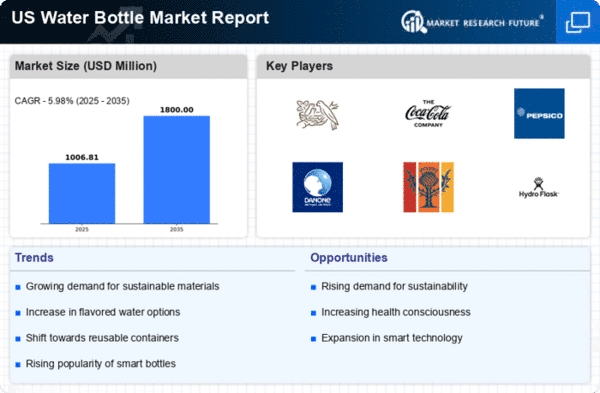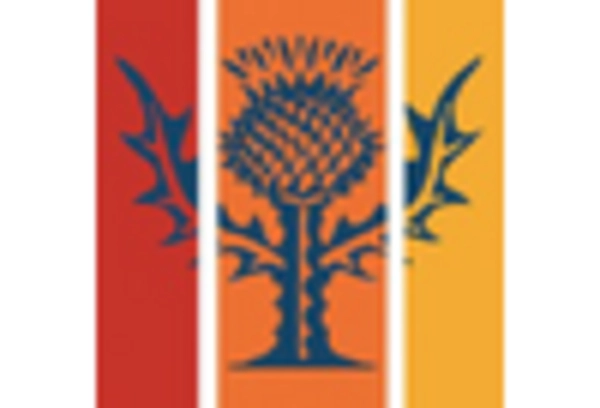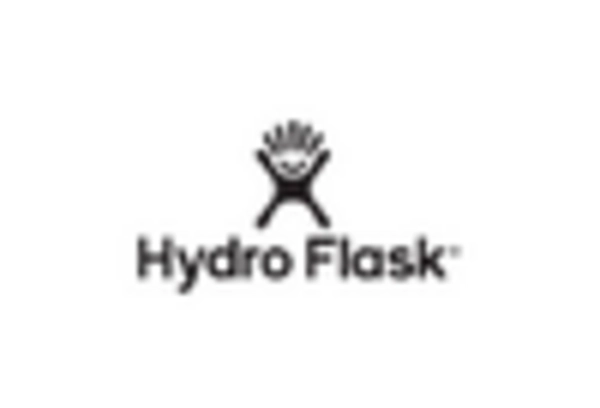E-commerce Growth
The rapid expansion of e-commerce platforms is reshaping the water bottle market landscape. With online sales accounting for over 30% of total retail sales in the US, the water bottle market is experiencing a significant shift in consumer purchasing behavior. The convenience of online shopping, coupled with the ability to compare products and prices, is driving more consumers to purchase water bottles online. This trend is likely to continue, as digital platforms enhance user experience through personalized recommendations and targeted marketing. As a result, brands that effectively leverage e-commerce strategies may capture a larger share of the market, adapting to the evolving preferences of tech-savvy consumers.
Innovative Designs
The water bottle market is increasingly influenced by innovative designs that cater to diverse consumer needs. As brands introduce features such as built-in filters, collapsible structures, and smart technology, the market is expanding to accommodate various lifestyles. Recent surveys indicate that nearly 60% of consumers are willing to pay a premium for water bottles that offer unique functionalities. This trend suggests that the water bottle market is not only competing on price but also on the value added through design and innovation. As consumers seek products that enhance their daily routines, the demand for creatively designed water bottles is likely to grow, driving market expansion.
Health Consciousness
The increasing awareness of health and wellness among consumers appears to be a pivotal driver for the water bottle market. As individuals prioritize hydration for overall health, the demand for water bottles has surged. According to recent data, approximately 70% of consumers in the US actively seek out reusable water bottles as part of their health regimen. This trend is likely to continue, as more people recognize the importance of staying hydrated. Furthermore, the water bottle market benefits from the growing inclination towards fitness and outdoor activities, where portable hydration solutions are essential. The emphasis on health is not merely a passing trend; it seems to be a fundamental shift in consumer behavior, thereby propelling the market forward.
Environmental Regulations
The implementation of stringent environmental regulations in the US is influencing the water bottle market significantly. As legislation increasingly targets single-use plastics, manufacturers are compelled to innovate and adapt. The water bottle market is witnessing a shift towards eco-friendly materials, with a reported 40% of consumers expressing a preference for sustainable products. This regulatory landscape not only encourages the production of biodegradable and recyclable bottles but also fosters a competitive edge for brands that prioritize sustainability. Companies that align their practices with these regulations may find themselves better positioned in the market, appealing to environmentally conscious consumers and potentially increasing their market share.
Brand Loyalty and Marketing Strategies
Brand loyalty plays a crucial role in the water bottle market, as consumers increasingly gravitate towards established brands that resonate with their values. Effective marketing strategies, including social media engagement and influencer partnerships, are vital for capturing consumer attention. Data indicates that approximately 50% of consumers are influenced by brand reputation when selecting water bottles. This trend highlights the importance of building trust and credibility within the water bottle market. Brands that successfully communicate their commitment to quality and sustainability may foster stronger customer relationships, ultimately enhancing their market position and driving sales.
















